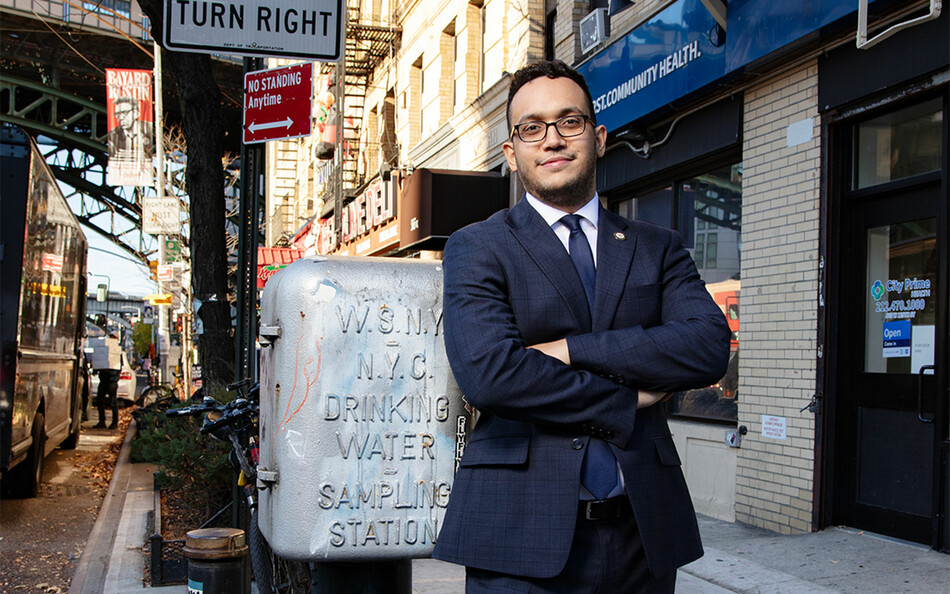New York has drug-free zones, gun-free zones, car-free zones, and phone-free zones. But rat-free zones? The idea might seem impossible to anyone who has run the gauntlet of swollen plastic garbage bags on the city’s sidewalks and observed the well-fed creatures darting in all directions. One estimate puts their number at three million. But if Shaun Abreu ’14CC has his way, the rat bacchanalia will be wrapped up soon.
Abreu, who is in his second term on the New York City Council and is chair of the sanitation committee, represents District 7, which covers West Harlem, Manhattanville, and Morningside, Hamilton, and Washington Heights. In 2022, the city council passed Abreu’s bill calling for “rat mitigation zones” in areas where rat complaints to 311 are the highest, including in District 7. Abreu wants his ward to be a model of mitigation for the entire city.
But how? Abreu doesn’t like poison (neither do the rats), which has never worked as a long-term solution and which poses a threat to other urban wildlife (Flaco, the Eurasian eagle-owl who fatally crashed into an Upper West Side building last winter, had high levels of rodenticide in his system). Instead, Abreu’s plan relies on two main strategies: containerization and contraception.
“Our trash bags do not belong on the street as a rat buffet,” Abreu says. “They belong in containers.” A fleet of European-style, ratproof curbside bins, eight feet long and meant to be shared by residents, have been deployed in West Harlem from 143rd to 153rd Street, and Abreu says that rat sightings there have gone down by more than 50 percent. “And you know what? Next spring, from 110th to 155th, including the Columbia area, everything on the street is going to be in a container. We may lose some parking spots, but it’s for the public good.”
That’s what Abreu likes best about the job: showing his constituents that government works. “I like to make it clear to people through examples,” he says. “When people wake up and see that their trash is gone, when they wake up and they see that crossing guard on the corner helping their child get to school, when they wake up and see the roads getting paved — that’s government working.”
Abreu, thirty-four, hopes to add “when they wake up and see no rats” to his litany. This past fall, he introduced legislation for a pilot project in District 7 that would dispense contraceptive pellets to rats. “Two rats in a given year can produce fifteen thousand descendants,” says Abreu, who is as conversant in rat stats as he is in the numbers of his beloved Yankees. “And I can tell you this: birth control works in a lab setting. We’ve seen Brussels use it for pigeons. Other cities have seen success as well. We now have an opportunity to try it out in our city.”
The son of Dominican immigrants, Abreu grew up on West 161st Street in Washington Heights. When he was young, his family was evicted from their apartment. His parents lost their jobs, and when Abreu was in fourth grade at PS 4, he failed the state reading exam and was held back. But the family kept pushing. Abreu received support from his teachers. His mother got a job at Zabar’s and his father became a janitor at Port Authority Bus Terminal — and a proud union member. “When a labor union asks me to do something, I jump, because labor is fighting for working families,” Abreu says. “I was able to get braces as a kid. Why? Because my dad had amazing health insurance. My mom is a type 1 diabetic, and my dad’s union made it possible to get affordable insulin. Labor unions matter, and that’s why New York City is a union town.”
In high school, Abreu was accepted into Columbia’s Double Discovery program, which helps low-income students from Washington Heights and Harlem prepare for college. “I got subject-specific tutoring and learned how to take standardized tests. I also learned about the city and how government can make things better for families.” Abreu got in to Columbia, where he majored in political science. In his junior year, he was the campaign manager for Mark Levine, his District 7 predecessor at City Hall (Levine is now Manhattan borough president).
After college, Abreu earned a law degree from Tulane and moved back to New York to become a tenants’ rights lawyer, helping families facing eviction. Wanting to do more for his community, he ran for city council in 2021 and won. In 2023, Abreu fought successfully to allocate $40 million to cover legal fees for residents facing eviction.
As someone who is “married to politics,” Abreu has devoted himself to “helping the people I grew up with,” whether they’re dealing with unscrupulous landlords or fecund rodents. He insists that government can put a lid on the city’s problems, even its hairiest ones. “How New York City manages trash in District 7 will determine how we manage trash — and rats — citywide,” Abreu says. “We’re showing the way forward.”



